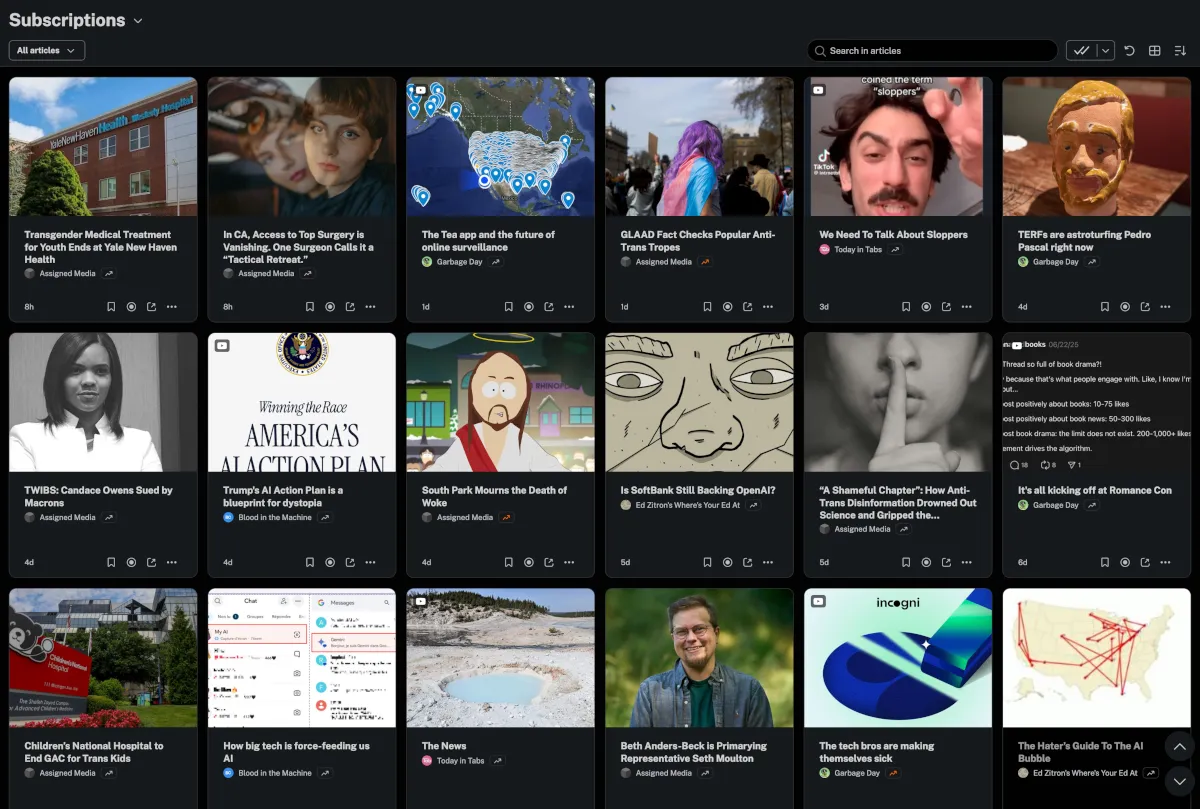Earlier this week I met someone new and he asked me what I do for a living, and I said “I’m a writer,” and he said “Oh, what do you write?” This conversation happens often enough, and in virtually the same words, that I recognized right away where we were headed. I told him about Tabs and at that point although my new friend didn’t know it yet, we were already on a greased slide toward the moment where I would say: “…but these days I only write it once or twice a week, because the American news media has been systematically and intentionally destroyed by a handful of billionaires.”
Activity tagged "media"
This model of media capture has since become a case study in soft authoritarian control. Its blueprint rests on four pillars: the takeover of public media, the political capture of the media regulator, the deployment of state funds as leverage over editorial content, and the strategic acquisition of private outlets. This formula has been successfully exported—with variations—to other countries. ... Efforts to manipulate the media are nothing new; history is littered with regimes that sought to bend the press to their will. What distinguishes this modern form of capture, however, is the role of the private sector. Corporations reliant on government contracts or regulatory leniency buckled under pressure, buying up media outlets and turning them into mouthpieces of state propaganda. In the digital age, media capture is often coupled with digital authoritarianism, where governments and non-state actors collaborate to use technologies to conduct surveillance, restrict access to information, and distort the journalistic ecosystem with authoritarian-friendly outlets and campaigns of disinformation.
How James Gunn's comments about "basic human kindness" triggered a predictable right-wing media meltdown.
Lawsuits like this one are not something to celebrate just because you hate Fox News.
I'm not normally one to agree with Fox, but they're right in their statement that suits like this are "designed to chill free speech critical of [Newsom]."
The true solution, perhaps, is more solidarity and more sincerity.
people talk about “the media” and “journalists” and they picture the New York Times, Wall Street Journal, or cable news.
and sure, “the media” is the Big Five. but it’s also non-profit newsrooms, independent journalists, international and/or non-US publications, worker-owned media collectives, bloggers, local newsrooms, citizen journalists, podcasters, critics, community radio stations, documentary filmmakers, trade publications, freelancers, fact checkers...
if you applaud attacks and legal intimidation against “the media” and “journalists” because you are picturing the former, remember that it is ultimately the smaller fish who will suffer the most from it.
don’t let the failures of some (major) news outlets disillusion you with media as a whole. and especially don’t let those failures desensitize you to attacks on free expression.
we can criticize media failures while also fiercely defending media freedom.
it is scary to see people responding to trump’s baseless lawsuits against the NYT and others with a shrug because of their complaints about those outlets’ coverage of him.
we can oppose lawfare against media institutions and also hold those institutions properly to account for poor coverage.
allowing authoritarians to target media institutions you don’t like only works until they decide to start targeting the ones you do — often ones with far fewer resources than the NYT and its ilk.
The drumbeat of legal threats signals a potentially ominous trend for journalists during Trump’s second term in office. Litigation is costly and time-consuming. Most news organizations will look to settle rather than face months—more likely years—of discovery and depositions, plus significant legal fees.
“It is both conscious and unconscious. Journalists at smaller outlets know very well that the costs for their organization to defend themselves could mean bankruptcy. Even journalists at larger outlets don’t want to burden themselves or their employees with lawsuits. It puts another layer of influence into the journalistic process,” [Anne Champion] said.
Perhaps the CJR editors decided it went without saying, but it feels worth mentioning that — if Trump’s appointments go as planned — he will have the entire judicial branch to bring to bear on journalists, not just his wacky lawyer neighbor.
"There should be newspapers that we work at where we do this"
Bit of a heartbreaking comment from Jonathan M. Katz (also of The Racket), who was the first to note that Senator Katie Britt had apparently brazenly lied while recounting an anecdote in her bizarre State of the Union rebuttal.
There should be newspapers that we work at where we do this.
And then the other piece of it is, there is this good aspect to the democratization of media. In some ways it’s nice that the barriers to entry are lower, because there's nothing to enter into.
The good news is no matter what your background, no matter where you come from, you too can make no money.
His interviewer comments, "You can starve also."
He agrees: "You too can starve by posting crap to social media. So that's good, I guess."
